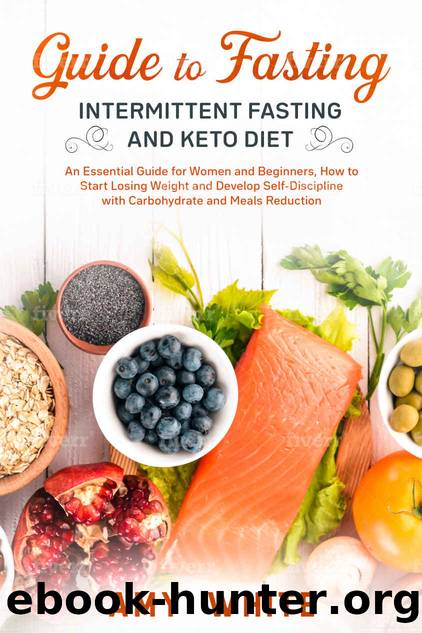Guide to Fasting, Intermittent Fasting and Keto Diet: An Essential Guide for Women and Beginners, How to Start Losing Weight and Develop Self-Discipline with Carbohydrate and Meals Reduction by Amy White

Author:Amy White [White, Amy]
Language: eng
Format: azw3
Published: 2020-06-23T00:00:00+00:00
Chapter 6 Frequency of Fasting
Fasting is a pattern of eating that oscillates between periods of eating and fasting. There are a lot of myths about this method of fasting. In this chapter, let us debunk the most popular misconceptions that exist about fasting, snacking, and the frequency of eating.
Skipping breakfast will make you gain weight
Well, breakfast isnât as important as people seem to think. Skipping breakfast wonât make you fat and you can do so quite safely without any fear. You can fast for 16 to 24 hours at a stretch without worrying about the functioning of your body. Your body knows whatâs best for it so trust your body.
Your metabolism improves when you eat frequently
It is a popular myth that eating frequently helps improve your metabolism. Eating small meals does not improve your bodyâs ability to burn calories. Yes, your body does need some energy to digest and assimilate the food you consume. This is referred to as thermic effect of food and it accounts for about 20-30% of total calories from protein, 5-10% from carbs and about 3% from fats. On an average, the thermic effect of food accounts for 10% of the total calories you consume. You need to take into consideration the total calories you consume and not the number of meals you eat. You donât need to keep eating constantly. For instance, if you have three meals of 1000 calories each the thermic effect will be 300 calories and it will be the same if you have 6 meals of 500 calories each. So, you can fast for prolonged periods of time and not worry about slowing down your bodyâs metabolism.
Eating frequently helps keep hunger at bay
People believe that snacking constantly helps to keep hunger at bay and reduces the chances of excessive hunger. Frequent meals will obviously leave you feeling full, but you donât have to do this. If you want to reduce your cravings and keep hunger at bay, then you need to make sure that you are filling yourself up with the right kind of food. Your meals must contain high amounts of fiber, protein and healthy fats instead of carbs. A meal thatâs rich in carbs will make you feel hungry soon and make you want to eat more food. Consuming carbs makes you crave for carbs. So, a balanced meal is the key to reducing your hunger. You donât have to worry about hungry pangs while following the protocols of Intermittent Fasting.
Small meals assist in weight loss
As mentioned earlier, frequent meals donât help boost your metabolism. Small meals wonât do your body any good and they certainly donât help in weight loss. Eating frequently has the opposite of the desired effect. You can fast for an entire day without worrying about your body metabolism. There wonât be a change in your energy levels if you keep snacking constantly. If you are worried that fasting leads to weight gain, you can lay those fears to rest. In fact, your body will start burning its reserves of fat to provide energy if you restrict the supply of glucose.
Download
This site does not store any files on its server. We only index and link to content provided by other sites. Please contact the content providers to delete copyright contents if any and email us, we'll remove relevant links or contents immediately.
How to Be a Bawse: A Guide to Conquering Life by Lilly Singh(7472)
Deep Work by Cal Newport(7068)
The Longevity Diet by Valter Longo(5058)
The Fat Loss Plan by Joe Wicks(4908)
The Four-Pack Revolution by Chael Sonnen & Ryan Parsons(3974)
The Ultimate Bodybuilding Cookbook by Kendall Lou Schmidt(3939)
The French Women Don't Get Fat Cookbook by Mireille Guiliano(3659)
Not a Diet Book by James Smith(3411)
Super Food Family Classics by Jamie Oliver(3408)
Factfulness_Ten Reasons We're Wrong About the World_and Why Things Are Better Than You Think by Hans Rosling(3235)
Turn Up Your Fat Burn! by Alyssa Shaffer(3215)
Self-Esteem by Matthew McKay & Patrick Fanning(3141)
Tom Kerridge's Dopamine Diet: My low-carb, stay-happy way to lose weight by Kerridge Tom(3105)
Body Love by Kelly LeVeque(3053)
The Unbecoming of Mara Dyer by Michelle Hodkin(3040)
Tone Your Tummy Type by Denise Austin(2836)
The Fat Chance Cookbook by Robert H. Lustig(2832)
LL Cool J's Platinum 360 Diet and Lifestyle by LL Cool J(2731)
Men's Health Best by Men's Health Magazine(2598)
